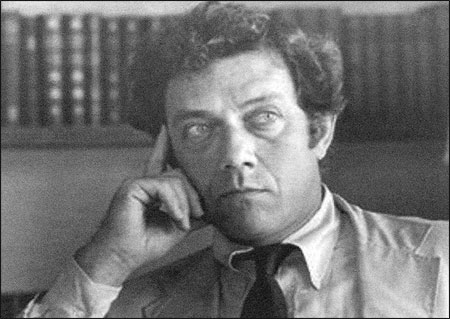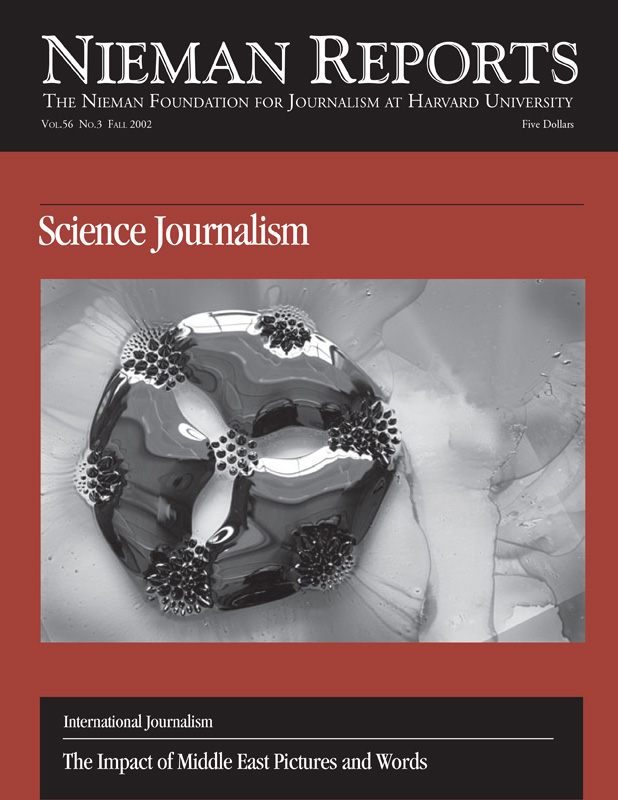
James Thomson, Curator of the Nieman Foundation from 1972-1984, died on August 11 of cardiac arrest after a brief illness. He was 70. What follows are words contributed by Niemans who knew him well and would like others to know about his work as Curator and its impact on their lives and on the Nieman program. At the end of their reflections is information about how to share your remembrances with the Nieman community through our Web site.
From Jane Daugherty
He was frequently erudite, occasionally outrageous, and always eager to throw open Harvard’s sometimes heavy doors to “his Niemans.”
James Thomson, Nieman Foundation Curator from 1972-84, was an enigma. More scholar than journalist, more China-hand than newsroom insider, he was an early and articulate opponent of the Vietnam War who advised both Presidents Kennedy and Johnson.
Besides his late wife, Diana, who both enthralled and confounded him, his first love and great appreciation was of China. His early advocacy of reestablishing ties with the People’s Republic of China predated the shift in U.S. policy by more than a decade.
Despite numerous academic publications, perhaps his single most influential piece of writing was published in 1968 in The Atlantic Monthly, “How Could Vietnam Happen?” It won the Overseas Press Club Award and influenced a generation of reporters and policy analysts.
When Jim returned to Harvard four years later, he began 12 years of curatorship that gradually brought more women and minorities into what had been the most prestigious good-old-boys’ club in American journalism—and he did it not without detractors.
Jim’s last class of Niemans, of which I was a member, was the first female-majority among the U.S. Niemans—among our dozen we counted seven women, the first Native American Nieman, and two African Americans. And not a weak sister (or brother) among us.
I’ll always remember Jim, with his wry smile and twinkling eyes, as an honorable man in often-dishonorable times. He was willing to be a courtly maverick, an advocate, even a polite annoyance when necessary, whether it came to criticizing U.S. policy or to getting “his Niemans” access to the classes and professors who could enlarge or enrich our Harvard experiences.
At Jim’s going-away reception in 1984, I overheard our class somewhat disparagingly called “Jim’s last hurrah.” If we were, it was an honor, Mr. Thomson.
Jane Daugherty, a 1984 Nieman Fellow, is news editor of The Palm Beach (Florida) Post.
From David Lamb
Jim Thomson had a twinkle of mischief in his eye. It was as though he knew something the rest of us didn’t. He’d give you that nod and half-smile and puff on his cigar. But I was never quite sure what he was thinking. What was he holding back? What I do know, though, is that beneath that reserve was a man of warmth, intellect and wry humor. He was a man I trusted, admired, respected, liked immensely. If I were giving a dinner party, he is the man I’d seat next to the guest of honor.
I had the good fortune to be a Nieman Fellow when Jim’s tenure as Curator was already well established. My wife was given the same wonderful opportunities at Harvard as was I. Jim gets credit for that. We had our own “home” at One Francis Avenue. Jim gets credit for that, too. We were treated as adults, not cub reporters whose time needed to be micro-managed by some misplaced managing editor. Again, thanks, Jim.
In 1980-81, we referred to ourselves as “the Greatest Nieman Class Ever.” If I may be bold enough to speak for my class, I’d like to say, “We owe you one, Jim. You were the Greatest Nieman Curator Ever.” We’ll miss the hell out of you. We thank you for giving us so much—not the least of which was one of the best years of our professional lives—and for fulfilling the only thing you asked in return: You made us more thoughtful journalists.
David Lamb, a 1981 Nieman Fellow, is a reporter for the Los Angeles Times.
From Alex Jones
At the time I applied for a Nieman fellowship, I was editor of a newspaper in a rural county in Tennessee with a circulation of 15,000.
Jim Thomson didn’t care that my professional origins were not blue chip. Under his gentle prodding, the selection committee put me on the list and my life changed forever. As with most things, he followed his own counsel, which was almost certain not to reflect the orthodoxy of the moment.
Jim’s delight in sailing against the wind was evident in his sardonic humor and his determination to tell his colleagues in the Kennedy and Johnson administrations that they were way wrong on Vietnam and China.
When the Nieman Foundation was placed in his hands, he used that same clear and humane vision to make the Nieman experience—which then mostly excluded women, minorities, foreigners, spouses, and even broad-casters—into a model of inclusion. This was a radical change, but I came to believe that the prospect of disapproval only made something more appealing to Jim.
The tone Jim set was one of generous respectfulness.
I sometimes thought that he approached each year’s Nieman class like a particularly desirable group of weekend houseguests, who should be treated with affection and whose quirks and whims should, if possible, be humored. I recall feeling that he had created the most civilized environment I had ever experienced, with high seriousness and robust fun intermingled with a joyous delight in learning.
With his cigars and bemused asides, Jim seemed to take pleasure in being with us, knowing us, and following us in the years after our time at Lippmann House.
His generosity of spirit had to keep company with a streak of stubborn contrariness that could be self-destructive. But this bloody-mindedness was also his glory.
When his wife, Diana, died 18 months ago, it was the end of a profound love affair. They were welded to each other, and Jim had nursed her patiently and devotedly for much of the past decade. Without her companionship, he seemed to lose some of his sense of purpose.
In the past year, he declined—in part because of his own behavior. And while it was frustrating to those of us who loved him and were trying to save him from his own excesses, it was also oddly inspiring to see him defy us all and do as he pleased.
He was determined to live what remained of his life in his own way, and was obstreperously, wonderfully independent to the end.
Alex Jones, a 1982 Nieman Fellow, is director of The Joan Shorenstein Center on the Press, Politics and Public Policy at Harvard University.
From Ned Cline
Jim Thomson may not have been the inventor of equality and diversity among journalists, but he deserves the title of New England distributor. He was a trailblazer for journalists like me.
Nieman Fellowships have long been considered among the most prestigious honors in the field, deservedly so. But until Thomson joined the team, vast majority of the awards had been made to white males with long pedigrees from large newspapers. Thomson changed that. He did it because it was overdue and was the right thing to do.
That’s just the way he was. He wanted everyone, regardless of gender, race or social status, to have an equal chance. I shall be forever grateful for what he did. Without him, odds are I would never have made the short list or been chosen. My class of 12 American journalists set new Nieman records for diversity: four women, an African American, and several white guys like me from small newspapers.
My background was growing up in a small Southern village, holder of a degree from a small town college and experiences only on newspapers with little-known names. Thomson wanted this kind of diversity to supplement the big city newspaper folks because he felt it would make all of us better. I think he was right.
Journalism and the Nieman fellowship program are better because of Jim Thomson. I don’t think I ever told him how much he meant to me. I wish I had.
Ned Cline, a 1974 Nieman Fellow, is a former managing editor of the Greensboro (N.C.) News & Record and is author of two biographies on North Carolina philanthropists.
A memorial service was held at Harvard’s Memorial Church on September 12th, followed by a reception at Lippmann House. That same day, Boston University honored Thomson with a symposium.
The Thomson family invites memorial gifts to be sent to the Nieman Foundation in support of international Nieman Fellowships. Checks should be made out to the Nieman Foundation International Fellowships Fund and sent to Lippmann House, One Francis Avenue, Cambridge, Mass. 02138.


